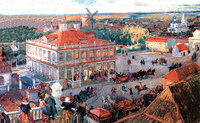Russia and Germany: 1000 years of relations
The history of the relations between Russia and Germany, whose 1000th anniversary is celebrated at the Historical Museum exhibition, convinces us that the two countries are meant to be close. They share too many things, far more than the two world wars.

"Wherever you look, there are Germans in Russia. Some Germans are more ingrained in the Russian land than Russians," wrote in the late 19th century art historian Dmitry Rovinsky. Indeed, in 1914 the country's population had over two million immigrants from Prussia. In terms of numbers, they took the fifth place among 110 nations that lived at the time in Russia.
Large numbers of foreigners were not an accident. At the time, Empress Catherine the Great issued a decree by which European residents were allowed to move to Russia. In addition, the state paid them for it, freeing them from taxes and giving them subsidies.
"In Europe, there was either a plague or cholera. In addition, it was difficult to find a job. It is not surprising that many Germans were happy to move to Russia", says Natalia Kargapolova, curator of the exhibition that opened at the Historical Museum "The Russians and Germans: 1000 years of history, art and culture."
"Artisans, merchants, and farmers were not the only ones who moved to Russia, there were also highly qualified specialists - scientists and doctors. The "guest workers" at the time were mostly Germans. Incidentally, they have settled on the entire territory of the empire, down to the Pacific.
The German contribution to the development of the Russian state was very substantial. If the secular salons were dominated by fashion for all things French, in science, education and public administration the Germans had a distinct advantage.
"They had very successful careers at the royal court as it was believed that the Germans are reliable," says Natalia Kargapolova. Peter the Great also invited German scientists to the Academy of Sciences he established. Then they would come on their own, like a linguist Vasily Radlov. Inspired by the Ural and Altaic languages, he moved to live in Russia, where he was renamed from William to Vasily Vasilyevich.
Doctor Theodore Gebler could not find a job in his native country and signed a six-year contract with the Russian medical service. Over time, he obtained Russian citizenship, became fascinated by science, becoming one of the most famous explorers of the Altai and was admitted to the Academy of Sciences.
In Barnaul where he settled, Theodore Gebler founded the first museum of natural history in Siberia, for which he ordered stuffed exotic animals from Berlin. Incidentally, Barnaul, where Gebler lived nearly all his life, in those days wore the proud title of "Siberian Athens" for its high level of development of science and art.
For many centuries Russia and Germany were connected with strong trade ties. In 1874 Germany has even received a priority in trade with the Russian state, previously held by England. Moreover, Prussia was considered a major ally of Russia. However, such a high profile relationship has not prevented a German diplomat Sigismund Herberstein from writing his famous "Notes on Moscow", where he described the locals like savages and barbarians.
This work, which was subsequently referred to by the majority of authors who wrote about Russia, has become very popular in Europe. But the Germans had other memories of Russia as well. "In an era of anti-Napoleonic wars, the Germans were terribly afraid of the troops of Ataman Platov.
Imagine their surprise when the "terrible Cossacks" turned out to be gallant gentlemen. Local residents made plenty of rave reviews for them," says Natalia Kargapolova. However, these reviews are stored in the archives and for some reason completely unknown to a wider audience.
At the opening of the exhibition at the Historical Museum it was suggested that the Russian and German people are actually very close. No doubt, there is some truth in this. But this closeness still has very specific boundaries.
While all Germans who came to Russia took the oath of allegiance to the Russian tsar, complete assimilation was not required of them. Some of them changed their names to Russian names and accepted Orthodoxy. But many preserved their faith and customs. The Germans have always settled separately - both in big cities (think Moscow's German suburb Peter the Great loved to visit) and the Siberian lands, creating their own settlements. There they had everything in their own way: German schooling, newspapers, holidays, not to mention the cuisine.
"In the beginning of the 20th century a broad debate was started in the newspapers about the separateness of the Germans - whether it should be allowed," says Natalia Kargapolova. What was the end of this discussion, we all know - the First World War."
Not surprisingly, Russians treated the Germans who lived in Russia for a long time, if not as strangers, then as different people.
Maybe this is why the most popular German hero in Russia was Baron Munchausen. There are two monuments to this fictitious character on the territory of Russia - in Moscow and Kaliningrad; there was one in Ukraine during the Soviet times, and one more recently appeared in Transnistria. The prototype of this character in his time served in Russia for 15 years in the first half of 18th century. Most of the stories about him were devoted to that period of his life.
The popularity of Munchausen in Russia, apparently, is easily explained: he always knew how to "pull himself by his hair" out of the most seemingly hopeless situations. No wonder that this trait that, perhaps, is not quite typical for the majority of Germans, was much liked by the Russians.
Svetlana Smetanina
Pravda.Ru
Subscribe to Pravda.Ru Telegram channel, Facebook, RSS!




